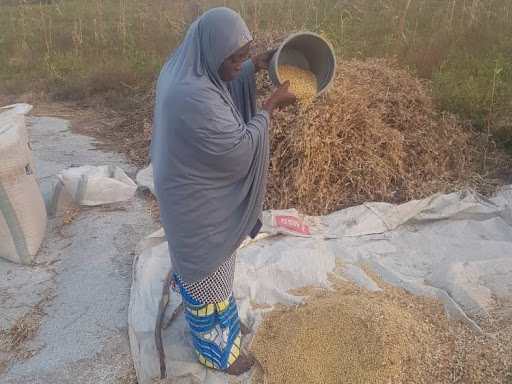
Climate Change Hits Nigeria, Small Scale Women Farmers
As the climate change effect hits across Nigeria, Susan, Zainab, and other smallholder women farmers bear the brunt.
Nigerian rural women farmers play vital roles in agricultural production and are key to Africa’s most populous country’s food security. They account for 70 percent of agricultural workers and 80 percent of food producers.
Nigerian Meteorological Agency (NIMET), the government agency that documents weather and climate data says there is evidence of climate change in Nigeria.
“These pieces of evidence are in the form of rising temperatures, more frequent and persistent heat and cold waves, severe coastal and inland floods, and the ravaging wind storms,” the agency stated in its climate review bulletins.
According to Michael E. Mann, one of the world’s most influential climate scientists, the world has “finally reached the point where it is not credible to deny climate change because people can see it playing out in real-time in front of their eyes.”
For 13 years, Godwin Susan, 60, has ventured into farming and raised her five children with proceeds from her farm. In those years, Godwin says 2020 stood out as the year of greatest loss.
Farmers in her village were happy when the rain started earlier but did not suspect it would stop abruptly. After Susan and others had planted their crops, the rains ceased for five weeks. Then COVID-19 pandemic broke out, and movement was restricted.
An abrupt stop of rainfall and deadly floods across parts of Nigeria are stark reminders of the climate risks facing Africa’s most populous country.
Many states in Nigeria rely on rainfall for agriculture boost, and shortage of rain makes many small scale holder farmers more vulnerable.
Susan had been cultivating groundnuts, maize, melon, and cassava on her different plots of land. The crops died after the rain stopped.
“Melon that we planted early was about to flower when the rain stopped suddenly. It started drying up and eventually died. In fact, there were a lot of losses,” she laments, unable to quantify her losses.
Susan is not unaware of climate change. She knows about planting early and using improved seedlings. What she does not know are its real impacts on farmers.
“We have heard about climate change. We were always told to plant earlier and use improved seedlings. We used the improved seedlings and planted earlier but the rain that did not come.”
Rising global temperatures, regular flooding, and rising water levels are part of the impacts of climate change. With the COVID-19 pandemic, the farmers’ woes were compounded. The troubled women couldn’t seek knowledge or advice from those that know about climate change.
“Things were very hard at that time, even to see the food to eat to survive was difficult, let alone to find money to buy another seedling to farm again. Maybe they could have taught us one way or the other to scale through this problem. And since there was a lockdown, we were helpless,” says Susan.
When the rain started falling again, it was already late for the farmers to replant their crops because “the little we had was what we had already planted on the farm.” The cost of clearing land and cultivating also jumped up by at least 100 percent.
“What we usually spend N10, 000 to cultivate, last year, we paid between N20, 000 to N25, 000,” the woman laments. “People from neighboring states used to come to cultivate our farms for us but last year, they couldn’t come because of the lockdown.”

